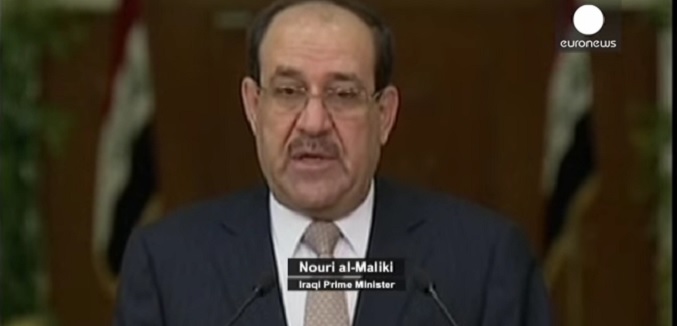Analysts and journalists seeking to explain the lightning advance of fighters loyal to the Islamic State of Iraq and Syria (ISIS) – the Al Qaeda offshoot that has been steadily consolidating territory across northern Iraq, despite being outnumbered roughly 30 to 1 by the country’s forces – have begun to specifically focus on sectarian tensions generated by programs that over the course of years politicized Iraqi institutions along sectarian lines.
A range of policies advanced by the Shiite-led government of Prime Minister Nouri al-Maliki are being blamed for alienating Iraq’s minority Sunni population in unprecedented ways, generating sympathy for ISIS years after Sunni tribal regions in Iraq had turned inhospitable to Al Qaeda.
Writing for CNN, Derek Harvey and Michael Pregent – respectively a former senior intelligence official who worked on Iraq from 2003-2009 and a former senior intelligence analyst who worked on Iraq from 2003-2011 – emphasized that “the speed and scope of this week’s assaults on every major city [by ISIS]… has been the predictable culmination of a long deterioration, brought on by the government’s politicization of its security forces.”
The process had long ago been dubbed one of “Shiafication.” More broadly, the Iran-backed Maliki is now being widely criticized for having prioritized Shiite expansionism over building pluralistic institutions that would have incorporated minority Sunnis.
Anthony Cordesman, who holds the Arleigh A. Burke Chair in Strategy at the Center for Strategic and International Studies, did not pull punches in calling for the U.S. to push Maliki out of power, linking him to every major crisis throughout the region:
Iraqi Prime Minister Nuri al-Maliki has become steadily more authoritarian, corrupt, and repressive. He has made the Iraqi security force his political tool, deprived it of effective leaders, used security funds for his own profit, and brought his supporters and relatives into the command chain. His ruthless repression of legitimate Sunni opposition and pressure on the Kurds – and lies and broken promises to Sunni tribal leaders – have lost him the support of Iraq’s Sunnis and Kurds and empowered ISIS. His broader failure to govern has led institutions like the World Bank and United Nations to give the same or worse ratings than Saddam Hussein, and his ties to Iran have helped it ship arms and volunteers to Syria, Hezbollah – which now presents a massive rocket and missile threat to Israel – and helped create the same rising threat in Gaza.
The sectarian divisions, which Maliki’s policies are said to have hardened, now seem set to escalate into a proxy war between the region’s Sunni and Shiite powers.
Simon Henderson, the Washington Institute’s Baker Fellow and the Director of its Gulf and Energy Policy Program, assessed in Foreign Policy on Thursday that “the ISIS invasion of Iraq is really a war between Shiites and Sunnis for control of the Middle East.”
[Photo: euronews / YouTube]




